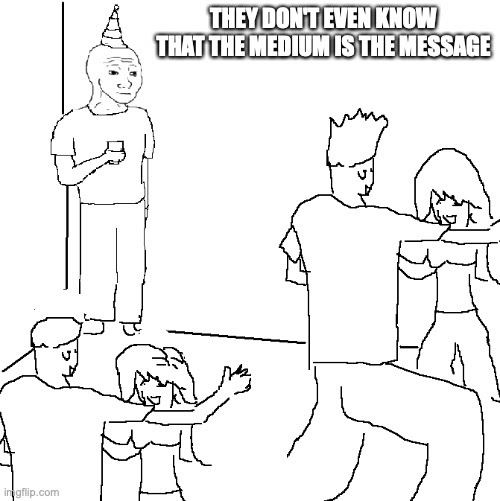This is a free preview of a subscribers-only post.
I don’t understand Marshall McLuhan.
He’s the guy who wrote, “the medium is the message,” a phrase you may have invoked at meetings and parties, trying to sound worldly and intellectual. I have, too.
But the honest truth is, I don’t get him. And despite how many times I have heard it and even repeated it myself, I don’t know why, exactly, the medium is the “message” versus any other thing it could be.
I really feel like I should. The phrase, and the book it appears in Understanding Media, predicted much of the impact of the internet before the internet was even a thing. It’s a phrase about the future, coming from the past. And I feel like if I understood it better I might get something important about how to understand technology’s effect on the world—an understanding that I could apply to things I see all over, from Web3 to AI to what we’re building at Every.
McLuhan is referenced everywhere in media and in tech. Wired Magazine founder Kevin Kelly named McLuhan Wired’s “patron saint.” Elon Musk cribs him in memes. Heck, even my co-founder Nathan cites him a lot.
The problem is that the sentence, “the medium is the message” occurs inside of a book that doesn’t make any sense. Reading Understanding Media is like trying to climb a rock wall coated in petroleum jelly. I’ve attempted it a few times, but I keep slipping off and falling on my butt. The first page doesn’t make sense, so I skim to the second page to see if my hands can find a convenient grip. But I just can’t find anything that gets me off the ground. Instead I get slippery zingers like this one:
“As extension of man the chair is a specialist ablation of the posterior, a sort of ablative absolute of backside, whereas the couch extends the integral meaning.”
Anyway, at this point, I know you probably feel the same way. You’re probably feeling like Mr. McLuhan’s use of the English language is some sort of ablative absolute of the backside. I concur.
But it would be really awesome if I—we—did understand what “the medium is the message” actually means.
So I decided to try to break it down. To do that, I read the first two chapters of Understanding Media where the phrase is introduced. I’m going to tell you what they say in as few sentences as possible.
Ready to go snorkeling in the depths of Lake McLuhan? Here goes.
Technology is a way of extending ourselves: our bodies and our senses
Understanding Media says it’s a book about media, but it’s really about technology. In the book, “media”, rather than referring specifically to the press or a type of content, is just the plural of “medium”—which is used interchangeably with “technology”. McLuhan sees media like TV, newspapers, and books as a kind of technology, and so his analysis places them on the same continuum as things like lightbulbs and airplanes.
So the book is about understanding technology. To do that, McLuhan has to answer another question: what is technology? He thinks of technology as “extensions of man”—technology is a way of extending our senses and our physical bodies beyond their natural physical limits.
This is a very interesting idea. It means we can look at something like a cup or an airplane or a TV through a new lens: a way of extending our natural capabilities. A cup extends our hands to hold a substance that they weren’t built to hold. An airplane extends our ability to move, and allows us to move many times faster than our bodies were originally made for. A TV, in McLuhan’s parlance, extends our nervous system, and allows us to experience things we would have never come into contact with otherwise.
We’ve been inventing these kinds of extensions for at least a few thousand years, and using our extensions to create more advanced extensions. McLuhan sees this as having created an “explosion” of our abilities outward. We can do more things in the world, we can cover more ground, we are extending our bodies in massive and important ways.
But he thinks there was an important change when we moved from mechanical technologies like cups or planes to electric technologies like the telegraph, the telephone, TV, and the radio. (He would say the same thing about the internet, but this book was written before the internet was really a thing.)

